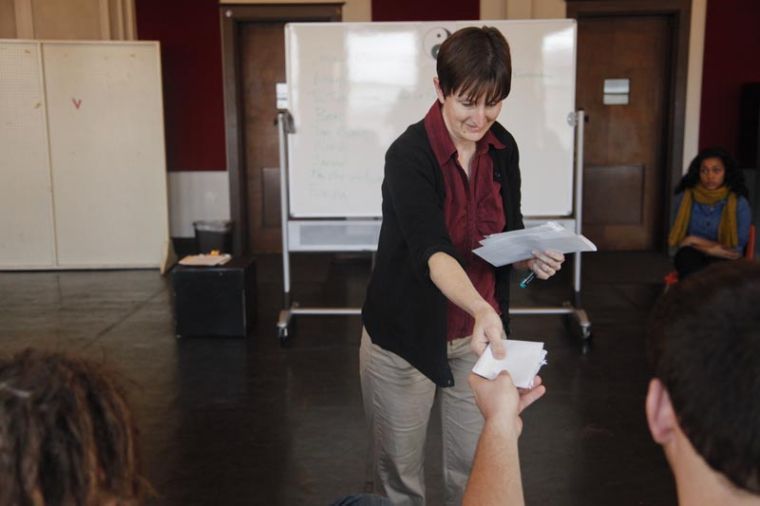The Second Act: theatre and sociology students work with juvenile delinquents
March 22, 2013
Juvenile offenders who’ve committed status offenses such as skipping school or underage drinking don’t often have a choice in their punishment; they sign up for community service, do their time and forget about it.
But a program here on campus is providing a more educational, and more meaningful, experience for both WKU and delinquent high school students who choose to participate.
It’s called the Patricia Minton Taylor Theatre-in-Diversion program, taught by Carol Jordan of the theatre department and Jerry Daday of the sociology department.
Named after a former professor in the English department who was active in local theatre, the goal of the program is to allow WKU students to gain real-world experience teaching and conducting research while helping mentor at-risk high school students.
“Most of these kids have done rather minor offenses…the goal is to try and keep them out of further problems, to catch things before they move into more serious stuff,” Jordan said.
“It offers a lot of opportunities for young people to express themselves in a wide variety of ways, as actors, directors, as writers, as designers, and I often find because it is seen more as a fun activity than many traditional academic courses, that it often engages a lot of students who aren’t normally engaged.”
Of the nine WKU students in the course, seven are theatre students who primarily teach and plan the theatre aspects of the course.
The two sociology students gather data, conduct interviews and put together a report for the Administrative Office of the Courts about the effectiveness of the program in preventing juveniles from conducting more, and possibly more serious, offenses in the future.
Corbin senior Sterling Franklin, a theatre student, said it’s been an experience that wasn’t what she expected.
“I expected there to be these kids who were really struggling with a lot of problems and who were acting out, and I was so wrong,” Franklin said. “They are just me, in high school. They are regular kids who made a mistake.”
Getting the juveniles on a college campus and getting them engaged with college students who act as positive role models gives the juveniles an opportunity to see that college isn’t as scary as they might have believed, and that continuing their education is a possibility for them after high school, Jordan said.
It’s a sentiment Daday agrees with completely.
“If you have a young person who is hanging out with the wrong crowd, putting them in a pro-social environment with adult role models – I’m talking about WKU students here – that can have an impact,” he said.
Daday’s hope is that if the program does its job well, some of the juvenile students may wish to become WKU students after high school.
“Getting them on the campus of WKU three days a week kind of shows them, ‘you know, this college stuff isn’t really a big deal,’ that it’s something they can do,” he said.
Jordan and Daday hope the program, currently in its second year, continues to prosper. They both said they would love for other departments on campus to create their own diversion programs. The program won an award last year for best diversion program in the state.
“Basically, any department could put something like this together, and that would allow even more opportunities for kids who have different interests,” Jordan said.
Franklin said what she’s learned so far in the program will stay with her long after she graduates – the idea that punishment doesn’t have to be miserable.
“I believe these students probably came into this expecting to be in trouble, expecting to be scolded, and it’s not about that, it’s about learning and having fun,” Franklin said.
“This is in some ways a punishment for them, but it’s such a proactive way of going about it. We don’t scold anyone or do anything like that; it really is just a pro-social, pro-active situation that is really benefiting all the parties involved.”
























